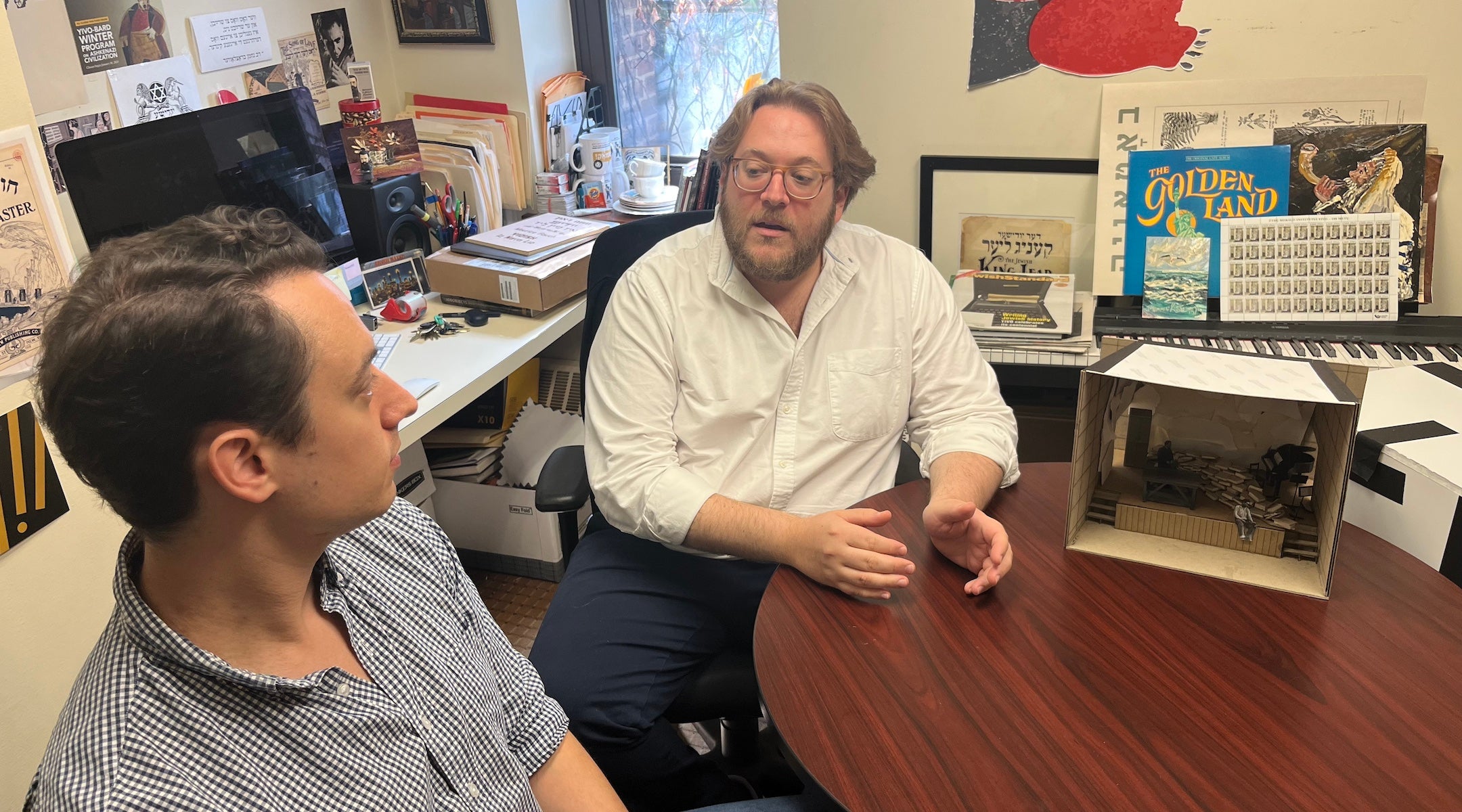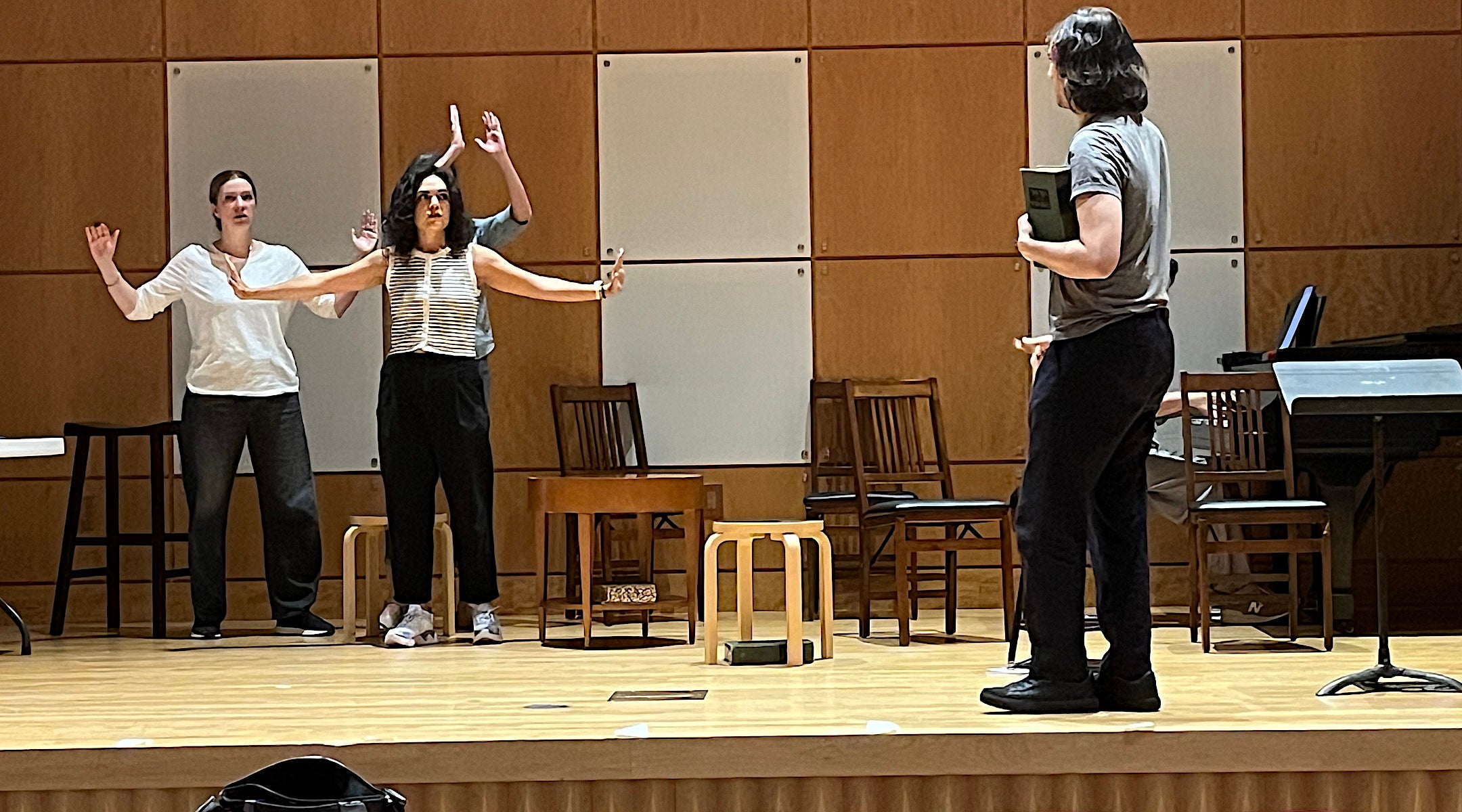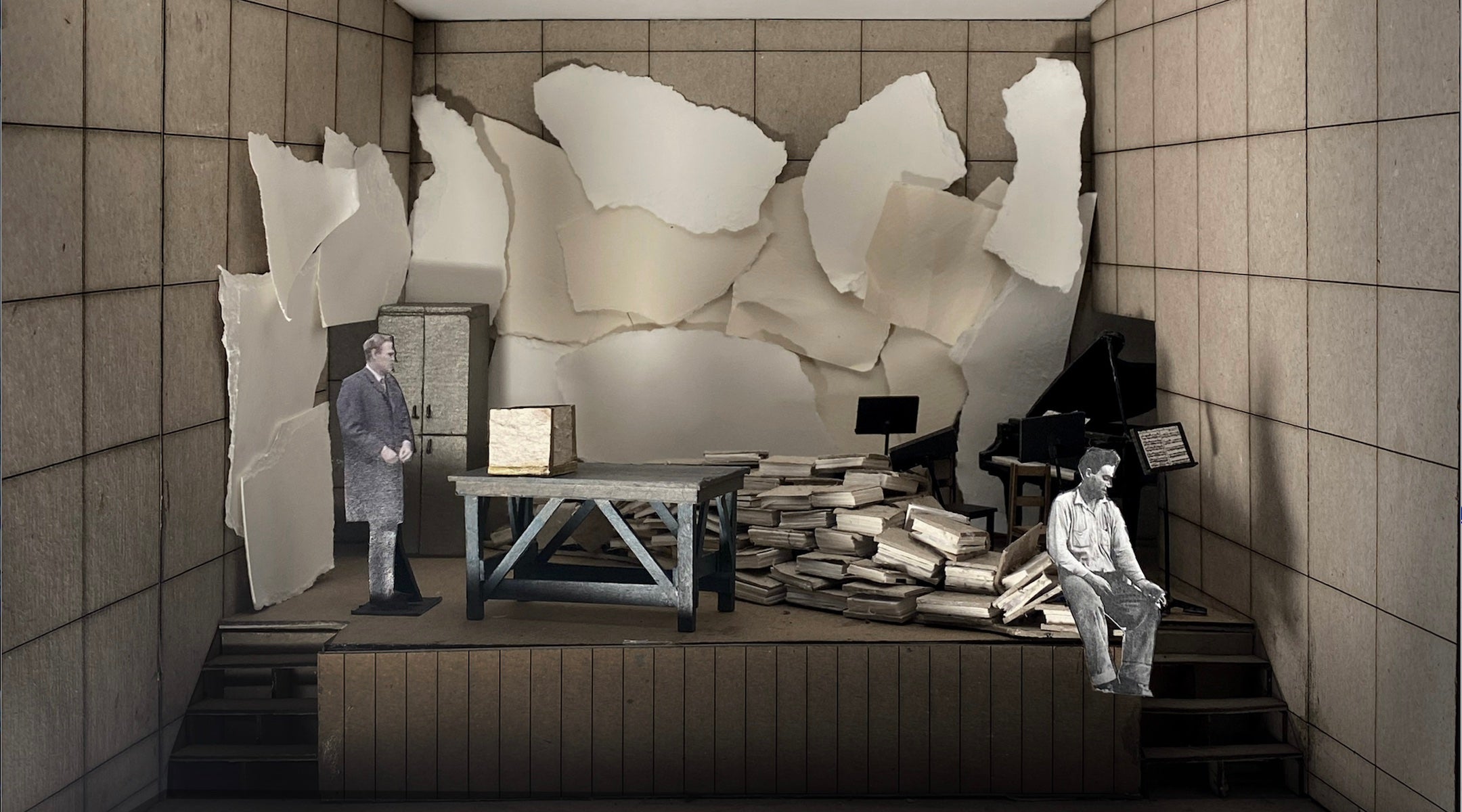In the hallways of New York’s YIVO Institute for Jewish Research, the story was told as a punchline: the great Yiddish dictionary project that took 25 years and never got beyond the first letter of the alphabet, aleph.
Composer Alex Weiser and librettist Ben Kaplan, both longtime YIVO staffers, heard the tale so often that it seemed like lore. Then they dug deeper — and found an epic.
The result is “The Great Dictionary of the Yiddish Language,” an original chamber opera premiering this week as part of YIVO’s centennial celebration. Featuring music by Weiser, a 2020 Pulitzer Prize finalist for an album of Yiddish and English song, and a libretto by Kaplan, YIVO’s director of education, the work dramatizes the extraordinary, and unfinished, post-Holocaust effort to create the definitive Yiddish dictionary.
“We’d heard the joke version — two Jews, three opinions, they couldn’t even make a dictionary,” Kaplan recalled. “But the real story is so much more powerful. These were Holocaust survivors and émigré scholars in New York, racing against time to salvage a civilization through its words.”
At the opera’s heart is Yudel Mark (1897-1975), the dictionary’s indefatigable editor, who in the piece is cast as a visionary. His foil is Max Weinreich (1894-1969), YIVO’s legendary director, a gatekeeper who demanded adherence to YIVO’s standardized spelling rules and kept one eye on budgets and deadlines.
“Mark is the prophet, Weinreich is the priest,” said Weiser, citing a classic essay by the Zionist thinker Ahad Ha’am that contrasts the uncompromising idealist with the enforcer of tradition.

Ben Kaplan, left, and Alex Weiser, seen in Weiser’s office at YIVO, are the co-creators of “The Great Dictionary of the Yiddish Language,” a new chamber opera about the monumental effort after the Holocaust to preserve the language and culture of Eastern European Jewry. (New York Jewish Week)
Mark worked in the 1950s out of a small office at YIVO’s mid-century headquarters on Fifth Avenue and later in Jerusalem. The four “aleph” volumes of the “Groyser verterbukh fun der yidisher shprakh” (“The Great Dictionary of the Yiddish Language”) appeared between 1961 and 1980. (The language has a plethora of words that start with aleph, as both a vowel sound and a silent letter.) After that — gornisht, as they say in Yiddish.
The volumes were published with a disclaimer from YIVO, which did not allow the use of the institute’s logo because of the orthography issue and other objections.
“After Mark’s death, mismanagement and continuing scholarly disputes paralyzed the dictionary project,” Gennady Estraikh, a professor of Yiddish studies at NYU, writes in “The YIVO Encyclopedia of Jews in Eastern Europe.” The story of the dictionary is fleshed out in a doctoral dissertation that Weiser and Kaplan drew on, written by Leyzer Burko, a Yiddishist with a doctorate in modern Jewish studies from the Jewish Theological Seminary.
The opera dramatizes the Mark-Weinreich clash as more than academic squabbling. It is staged as a battle over memory itself.
YIVO was founded in 1925 in Vilna, Lithuania as a hub for the academic study of East European Jewish life, language and culture. During World War II, much of its library was plundered by the Nazis, though portions were secretly hidden by the “Paper Brigade” of Jewish ghetto inmates. After the war, YIVO was reestablished in New York. At its current location at the Center for Jewish History on West 16th Street, it continues to preserve and study the legacy of Yiddish-speaking Jews while memorializing the lost.
As the opera opens, Mark is visited by three angels, performed by a trio of mezzo-sopranos, who embody three different forms of the letter aleph. They share a vision Weiser compares to the prophet Ezekiel’s valley of the dry bones. Instead of skeletons resurrected, it is a prophecy of words crumbling to dust — and revived through his dictionary.
“It’s exactly what he thought he was doing: resurrecting the Jewish people through language,” Weiser said.
“Mark saw words as sparks,” added Kaplan. “Lose a word and you lose a piece of the Jewish soul. That symbolism cried out for opera, not just history.”

At a rehearsal for “The Great Dictionary of the Yiddish Language,” tenor Jason Weisinger, right, portrays Yudel Mark and mezzo-sopranos Kristin Gornstein, Kate Maroney and Kelly Guerra portray angels who come to him with a heavenly vision for preserving Yiddish, Sept. 11, 2025. (New York Jewish Week photo)
The score avoids klezmer clichés. “This is an argument happening in an academy, not at a wedding,” said Weiser. Instead, he draws on post-minimalism, biblical chant, incantatory motifs and, to this ear anyway, Stephen Sondheim at his most operatic. In the opening, the three Alephs sing in shifting heterophony, evoking divine prophecy. “I wanted people to feel the storminess of letters swirling into life,” he said.
The libretto is largely in English, but the Alephs sing in Yiddish — a subversive twist that the creators refined in conversation with one of their mentors, Israeli novelist Ruby Namdar. In Jewish tradition, Hebrew is lashon hakodesh, the holy tongue, as opposed to mere “vernaculars” like Yiddish. “Usually Yiddish is the language of the jokers and schleppers,” Kaplan said. “But for Mark, it was sacred. We made it the language of the heavenly realm.”
Workshops of the opera have already earned blessings from Yiddish scholars and even from Mark’s daughter and granddaughter. At one showing, cultural historian and Yiddishist David Roskies — who had known the two protagonists personally — declared, “I wasn’t just watching them. I was watching Hillel and Shammai,” referring to the rabbinic sages whose arguments are preserved in the Talmud.
For Weiser and Kaplan, both 36, the opera is also a personal act of homage. “In a way, it’s a love letter to YIVO,” said Kaplan. “We’re standing on the shoulders of giants, people who smuggled books past the Nazis, who saved treasures for us to work with today. You can’t repay that debt. You can only try to honor it and carry it forward.”
The premier performances of “The Great Dictionary of the Yiddish Language,” on Sept. 18 and Sept. 21 at 1:00 p.m. ET are sold out. Tickets are still available for a third performance on Sept. 21 at 4:00 p.m. The opera is presented by and at YIVO in collaboration with American Opera Projects, the League for Yiddish, the American Society for Jewish Music, and the Consulate General of the Republic of Lithuania in New York, and co-sponsored by Nusakh Vilne.
The New York Jewish Week brings you the stories behind the headlines, keeping you connected to Jewish life in New York. Help sustain the reporting you trust by donating today.




